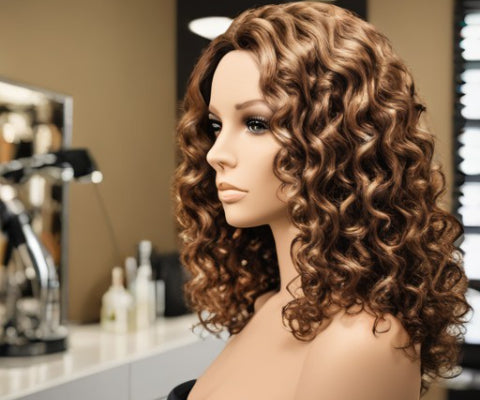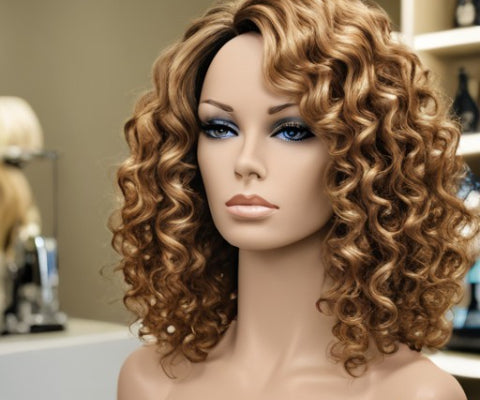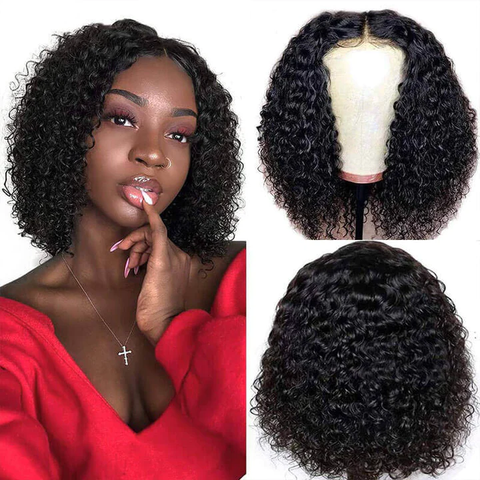Can you use a curling iron on a synthetic wig?

While styling your synthetic wig is a fantastic way to switch up your look, there's a crucial rule you must remember: extreme heat is a synthetic wig's worst enemy. Still, does this mean using a curling iron is a complete no-no? Not entirely, but it calls for caution and precision.
So I was just reading up on how to curl synthetic wigs, because I got this new one and was hoping to style it a bit. Basically, the deal is that you have to be really careful with heat around plastic fibers since they can totally melt or get messed up badly. but it turns out you can kind of curl them if you use low heat and keep the wig wet.
And first, I washed my wig really well to get it clean. Then I soaked it with a spray bottle until it was dripping—the key is keeping moisture on the fibers so they don't dry out when you apply heat.
I set my curling iron to the lowest temperature, around 130 degrees, though you have to play around based on what iron you have. Start low and go up slowly if you need to.
Then you just carefully wrap sections around the iron to put some curls in. Keep spraying it down with water as you go!
It seems tricky and risky, though, so if you're not confident, maybe get a professional stylist to handle it. But with some patience and caution, you can style synthetic wigs a bit with an iron on low heat.
What are the potential risks of using high heat on synthetic wigs?

Using high heat on synthetic wigs can have some serious consequences for the texture, appearance, and lifespan of the wig.
Synthetic wigs are predominantly made from plastic fibers, such as kanekalon or toyokalon, that poorly respond to intense heat. Outlined below are some potential risks associated with applying high heat to synthetic wigs:
-
Melting and Damage: One of the most obvious risks is outright physical damage to the wig. Excessive heat can cause these plastic fibers to melt, resulting in clumping, distortion of the style, or even creating holes in the wig. And sadly, once the fibers are damaged to this degree, there's no reversing it.
-
Loss of Shine: A critical characteristic of synthetic wigs that spectators often admire is their lustrous shine that gives the appearance of healthy, well-cared-for hair. However, applying high heat can degrade this shine, making the wig look dull, lifeless, and significantly less appealing.
-
Fiber Frizzing: Heat-friendly wigs come with their own set of pros and cons. While it's true that they can withstand some degree of heat, using them incorrectly can lead to frizzing, tangling, and generally disrupting the smooth texture of the wig.
-
Reduced Lifespan: The constant high heat can reduce the lifespan of your wig significantly, meaning you'll have to replace it sooner than you'd ideally have to.
-
Difficulty in Restyling: Once you've applied heat to a synthetic wig, it can be challenging to reshape or restyle it. The heat essentially sets the fibers in their current positions, so any attempt to alter that style may result in damage.
The best way to manage and style synthetic wigs is to use the recommended methods for each particular type. And remember, when in doubt, always return to the classic mantra: less is more!
How do you make a synthetic wig look natural?

One of the main concerns when wearing a wig is achieving that natural look. You wouldn't want your wig to be noticeable as a wig, would you? It's amazing how, with a few tips and tricks, you can make your synthetic wig look almost as natural as your own hair. Here's how:
-
What Wig to Choose? First things first, pick the right wig. You want one that says '100% hand-tied' or 'double mono' which means it's all handcrafted, and trust me, it looks more like your own hair than those machine-made ones.
-
How should it fit? A wig that doesn’t sit right on your head can look fake. It should feel snug but shouldn’t be too tight or slack. Most wigs come with adjustable straps that help you get the fit just right.
-
Trick for a Natural Hairline: You need a natural-looking hairline for your wig to look real. Many synthetic wigs have this cool feature of a pre-plucked hairline and baby hairs, so it just looks more like your own hair.
-
Ready to style? Don’t be shy; style your wig as you fancy. Give it a trim, thin it out, add layers, or change your parting. Just make sure your tools are wig-friendly.
-
Got a concealer? This might sound weird, but a touch of concealer or foundation can really make your wig blend with your look. Just dab a bit at the parting to make it match your scalp color.
-
Why a Wig Cap? Wig caps bind your natural hair and create a smooth layer for your wig. You'll find that your wig sits better and looks more real when it doesn't shift.
-
Shine too much? Synthetic wigs can sometimes have too much gleam. Don't worry, just use a bit of dry shampoo or talcum powder, and it will look more like your natural hair.
Remember to maintain your wig properly to enhance its lifespan and keep it looking natural and vibrant.
How do you style a synthetic wig without heat?
Thinking about the heat damage your synthetic wig might face could leave you scratching your head—can you even style them without turning up the temperature? You bet you can! Let's dive into some unerring ways to style your synthetic wig, all sans heat. That way, your wig stays vibrant, fetching, and in just-right condition.
1. Flexirods and Water: Your Curling Buddies Looking for those fun, springy curls without the heat fuss? Get your hands on some flexirods, a sprinkle of water, and a dose of patience. Start by making your wig just a touch damp, then wrap small wig bits around the flexirods. Once you've got the entire wig done, let it take a hot water plunge (just short of boiling) for about 5–10 minutes. Hold your horses until the air dries fully before taking the flexirods out. What you get are flawless curls without the need for or hazards of heat gizmos.
2. Traditional Roller Sets: Yes, the humble roller set you might remember from childhood can be used to style your synthetic wig without heat. Dampen the wig (not soaking wet), apply a setting lotion, and then roll using either velcro or magnetic rollers (avoid heated rollers). Let the wig dry completely before removing the rollers. The result? Beautiful curls or waves, depending on the size and type of roller used.
3. Braiding for Waves: Want soft, dreamy waves? Braiding your wig can help you achieve just that! After dampening your wig, work in sections and braid parts of the wig. The size of the braids will determine the resulting wave pattern. Once the braids are in place, let the wig dry naturally before unbraiding. This will give you beautiful, wavy locks.
4. Ponytail Method for Vertical Curls: For beautiful, vertical curls, put the wig into a high ponytail and secure it with an elastic band. After dampening the hair, section it into smaller parts, twist each section, and then use hairpins to hold the twists in place on the head.
How do you detangle a curly synthetic wig?

One of your biggest problems as a synthetic curly wig owner may be detangling it. Hey, though, don't worry! With a little perseverance and the appropriate knowledge, you can make your wig seem just as amazing as the day you purchased it.
Start at the Ends: Begin your detangling process from the ends and go upward to the roots. In this manner, you may prevent damage to your priceless wig by not pulling too hard.
Fingers Before Tools: To begin, gently work on the larger knots with your fingers. You'll have an advantage in untangling those tough knots thanks to the detangling spray's slickness.
It's Time for the Comb or Brush: Use your wide-toothed comb or wig brush to tackle the last of the stubborn knots once you've sorted the larger ones. Never forget that you must use patience and gentleness.
Divide and Conquer: Untangle the wig if it still appears to be one large knot. Using your hair clips, divide up your wig. Keep those curls intact with this special detangling trick.
Treat it to a bath: The wig needs to be washed after emerging victorious in the tangle war. Not only can a gentle shampoo and conditioner help get rid of stubborn areas, but it also restores your wig's luster and bouncy texture.
Recall that brushing out a curly synthetic wig requires patience. Yes, it could take some time, but with consistent patience and the correct maintenance, your wig will look as gorgeous and full again as it should!
FAQ About Style A Synthetic Wig
Q1: Is it okay to use a flat iron or curling rod on a synthetic wig?
Nope, your typical synthetic wigs aren't built to take the heat from styling tools. Applying heat can damage or even melt the synthetic fibers. That being said, there are synthetic wigs available that resist heat damage and can be styled appropriately in lower-heat settings.
Q2: How do I pump up the volume on my synthetic wig?
To up the volume, tenderly tease or backcomb your wig using a wide-toothed comb or wig brush. Just tread softly, as rough handling might cause frizzing or breakage.
Q3: Can I dye or color my synthetic wig?
Sorry, mate, synthetic wigs can't be colored or dyed like human-hair ones. Synthetic fibers simply don't soak up the dye like natural hair. So, if you're after a different color, your best shot is to buy a wig in the shade you're crushing on.






























































































